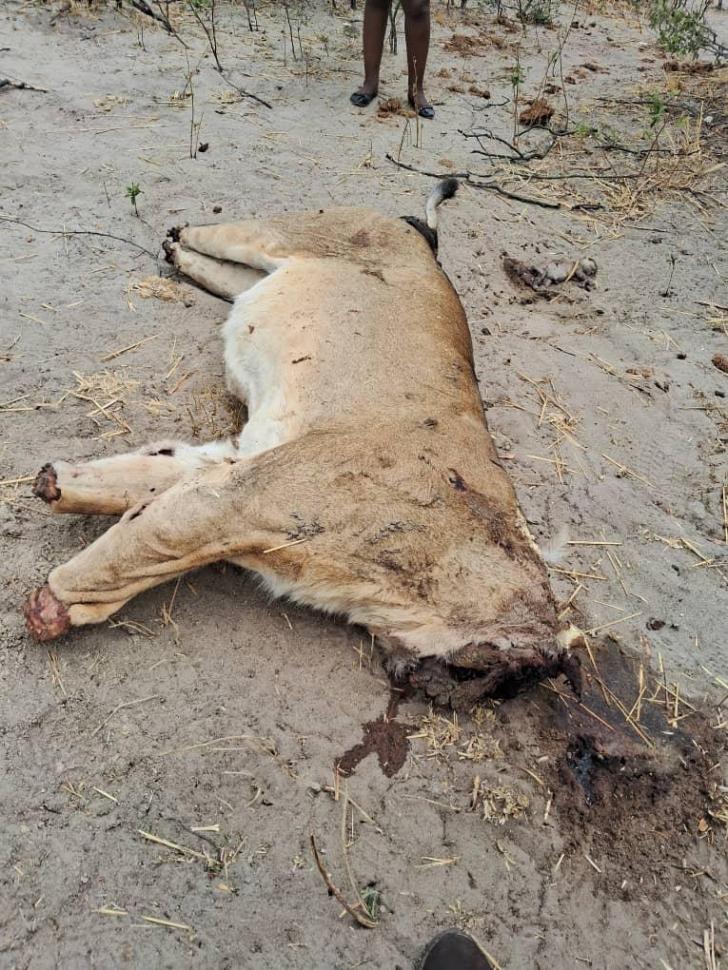News / National
Zimparks ranger arrested for lion poaching in Hwange National Park
28 Oct 2024 at 07:00hrs |
0 Views

A Zimbabwe National Parks and Wildlife Management Authority ranger has been arrested in connection with the recent poaching of three lions, whose carcasses were discovered headless and without paws in Hwange National Park. Hali Mabuya (39), stationed at Mtshibi Camp within the park, was found in possession of a .458-caliber service rifle and 52 rounds of ammunition, including 30 rounds that were reportedly not issued to him by his employer.
Authorities allege Mabuya used the service rifle to kill the lions last week, with a bullet head recovered at the scene matching his firearm. The incident is suspected to have taken place between Monday and Tuesday of last week near Dom Pan waterhole. The carcasses bore gunshot wounds to their shoulders, and investigators noted the presence of tire tracks and footprints, suggesting potential involvement by a poaching syndicate.
Mabuya allegedly drew suspicion after he approached a colleague in the armory department, requesting that she alter the dates on records of when he had signed out and returned the rifle. This request led to an internal investigation, resulting in Mabuya's arrest and the recovery of the rifle.
In court on Saturday, Mabuya faced charges of unlawful hunting and possession of ammunition without a certificate, violating Zimbabwe's Parks and Wildlife Act and the Firearms Act. Represented by attorney Joyline Change of Mvhiringi and Associates, Mabuya was remanded in custody until November 1.
Prosecutor Jemesina Makanza told the court that Mabuya allegedly hunted and killed a collared, gestating lioness, another female lioness, and one male lion, leaving the scene unnoticed. In addition to the rifle, a search of Mabuya's belongings uncovered eight rounds in his black satchel and various other ammunition calibers. The total 52 rounds seized raised concerns about the potential involvement of other rangers or an organized poaching network.
The lions, valued at approximately US$60,000, have rekindled memories of the infamous 2015 killing of Cecil, a well-known collared lion, by American hunter Walter Palmer. Cecil's death, which involved luring him out of the park and ultimately beheading him, ignited global outcry and brought attention to wildlife poaching in Zimbabwe.
The recent incident underscores persistent challenges facing Zimbabwe's wildlife conservation efforts, as authorities suspect poaching networks may involve insiders.
Authorities allege Mabuya used the service rifle to kill the lions last week, with a bullet head recovered at the scene matching his firearm. The incident is suspected to have taken place between Monday and Tuesday of last week near Dom Pan waterhole. The carcasses bore gunshot wounds to their shoulders, and investigators noted the presence of tire tracks and footprints, suggesting potential involvement by a poaching syndicate.
Mabuya allegedly drew suspicion after he approached a colleague in the armory department, requesting that she alter the dates on records of when he had signed out and returned the rifle. This request led to an internal investigation, resulting in Mabuya's arrest and the recovery of the rifle.
In court on Saturday, Mabuya faced charges of unlawful hunting and possession of ammunition without a certificate, violating Zimbabwe's Parks and Wildlife Act and the Firearms Act. Represented by attorney Joyline Change of Mvhiringi and Associates, Mabuya was remanded in custody until November 1.
Prosecutor Jemesina Makanza told the court that Mabuya allegedly hunted and killed a collared, gestating lioness, another female lioness, and one male lion, leaving the scene unnoticed. In addition to the rifle, a search of Mabuya's belongings uncovered eight rounds in his black satchel and various other ammunition calibers. The total 52 rounds seized raised concerns about the potential involvement of other rangers or an organized poaching network.
The lions, valued at approximately US$60,000, have rekindled memories of the infamous 2015 killing of Cecil, a well-known collared lion, by American hunter Walter Palmer. Cecil's death, which involved luring him out of the park and ultimately beheading him, ignited global outcry and brought attention to wildlife poaching in Zimbabwe.
The recent incident underscores persistent challenges facing Zimbabwe's wildlife conservation efforts, as authorities suspect poaching networks may involve insiders.
Source - The Herald
Join the discussion
Loading comments…









































